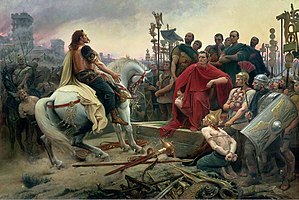Gallic Wars
| Gallic Wars | |||||||||
|---|---|---|---|---|---|---|---|---|---|
 Vercingetorix Throws Down His Arms at the Feet of Julius Caesar, 1899, by Lionel Noel Royer |
|||||||||
|
|||||||||
| Belligerents | |||||||||
| Roman Republic |
Gauls: Arverni Atrebates Bituriges Caletes Eburones Helvetii Menapii Morini Nervii Sotiates Suessiones Veliocasses Veneti Viromandui other Germanic: Aduatuci Sicambri Suebi Tencteri Ubii Usipetes Britons and Aquitanian tribes as well as portions of Iberian tribesmen |
||||||||
| Commanders and leaders | |||||||||
|
Gaius Julius Caesar Titus Labienus Mark Antony Quintus Tullius Cicero Publius Licinius Crassus Decimus Junius Brutus Albinus Servius Sulpicius Galba |
Vercingetorix Ambiorix Indutiomarus Commius Ariovistus Cassivellaunus |
||||||||
| Strength | |||||||||
| 120,000: 60,000 legionaries 60,000 auxiliaries |
300,000+ fighting men (mainly irregulars) |
||||||||
| Casualties and losses | |||||||||
| 30,000+ killed, 10,000+ wounded |
about 1,000,000 according to Caesar which mainly includes civilians killed. Modern estimates at least hundreds of thousands. |
||||||||
300,000+ fighting men
about 1,000,000 according to Caesar which mainly includes civilians killed.
The Gallic Wars were a series of military campaigns waged by the Roman proconsul Julius Caesar against several Gallic tribes. Rome's war against the Gallic tribes lasted from 58 BC to 50 BC and culminated in the decisive Battle of Alesia in 52 BC, in which a complete Roman victory resulted in the expansion of the Roman Republic over the whole of Gaul (mainly present-day France and Belgium). While militarily just as strong as the Romans, the internal division between the Gallic tribes helped ease victory for Caesar, and Vercingetorix's attempt to unite the Gauls against Roman invasion came too late. The wars paved the way for Julius Caesar to become the sole ruler of the Roman Republic.
Although Caesar portrayed this invasion as being a preemptive and defensive action, most historians agree that the wars were fought primarily to boost Caesar's political career and to pay off his massive debts. Still, Gaul was of significant military importance to the Romans, as they had been attacked several times by native tribes both indigenous to Gaul and farther to the north. Conquering Gaul allowed Rome to secure the natural border of the river Rhine. The Gallic Wars are described by Julius Caesar in his book Commentarii de Bello Gallico, which remains the most important historical source regarding the conflict.
As a result of the financial burdens of his consulship in 59 BC, Caesar incurred significant debt. However, through his membership in the First Triumvirate—the political alliance which comprised Marcus Licinius Crassus, and Pompey, and himself— Caesar had secured the proconsulship of two provinces, Cisalpine Gaul and Illyricum. When the Governor of Transalpine Gaul, Metellus Celer, died unexpectedly, this province was also awarded to Caesar. Caesar's governorships were extended to a five-year period, a new idea at the time.
...
Wikipedia
